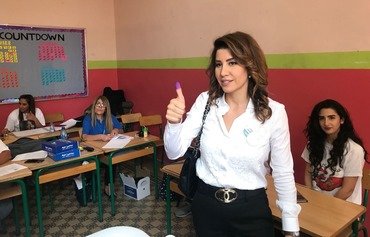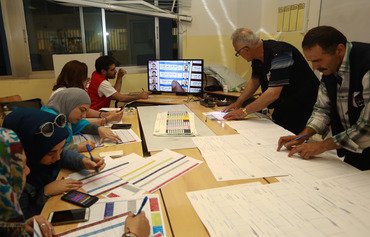Lebanon is set to hold general parliamentary elections on May 6th for the first time in nine years, in accordance with a new electoral law based on proportional representation.
The Ministry of the Interior has seen a strong turnout for nomination, with 976 candidates in the running, including 111 women -- a record number -- to fill 128 seats to be divided equally between Muslims and Christians.
In the 2009 elections, there were just 12 female candidates.
"Women are an added value to our national life, and they are half of society," university professor Roni Alpha told Al-Mashareq.
Among the female candidates is media professional Paula Yacoubian, a candidate on the Sabaa party list, who is running for the Orthodox Armenian seat in Beirut.
Yacoubian told Al-Mashareq she decided to run for election on the Sabaa list as "some people have reached the stage of despondency, and we wanted to bring about change".
"Whomever wants to bring about change must raise opposing voices that say, 'We will not be like the others, and we will perform well'," she said.
The Sabaa platform -- with its slogan 'The smile of a nation' -- "aims to bring about radical change", she added.
Elections are a right
After the nomination process was closed, communication between political forces intensified, with the formation of electoral lists and political alliances.
In an expression of his objection to the interim alliances and the new electoral law, Future Bloc head Fouad Siniora announced he would refrain from nominating himself for one of the two Sunni seats in Sidon.
This is because his convictions "do not agree with the principles, political requirements and basis of the current electoral law", he explained in a press conference.
Siniora said he believes the new law is "inconsistent with the constitution with regard to the way electoral constituencies are drawn and divided".
The new law divides the country along sectarian lines, he added, "which would intensify the conflicts among members of the same [electoral] list".
However, "one must respect the election results, whatever they may be", he told Al-Mashareq. "We want elections. It is a right for the Lebanese and must not be postponed, no matter what."
Alliances shape next parliament
"All things are changeable in alliances," political analyst Tony Abi Najm told Al-Mashareq.
"The coming days are crucial with regard to clarifying the alliances, as they will, to a great extent, define the shape and composition of the new Parliament," he said.
Prime Minister Saad al-Hariri has said he will not form an alliance with Hizbullah, and there are reports that the Future Movement will form an alliance with the Free Patriotic Movement under the leadership of Lebanese MP Gebran Bassil in a number of districts.
Meanwhile, the Progressive Socialist Party will form an alliance with the Lebanese Forces Party in the Chouf-Aley and Baabda districts.
Progressive Socialist Party leader, Lebanese MP Walid Jumblatt, will be absent from the 2018 parliament, having nominated his son Taymour to fill the Druze seat for the Chouf district.
Marada faction head, Lebanese MP Suleiman Franjieh, also intends to nominate his son, Tony Franjieh, in his place.
Meanwhile, Brig. Gen. Chamel Roukoz has announced he will head a list in the Keserwan-Jbeil district, the same seat for which his father-in-law and current Lebanese president Michel Aoun used to run.

![A picture taken on March 9th along a highway in the southern Lebanese coastal city of Tyre shows electoral billboards for the upcoming 2018 May parliamentary elections in Lebanon. [Mahmoud Zayyat/AFP]](/cnmi_am/images/2018/03/20/11917-Lebanon-elections-billboard-600_384.jpg)






